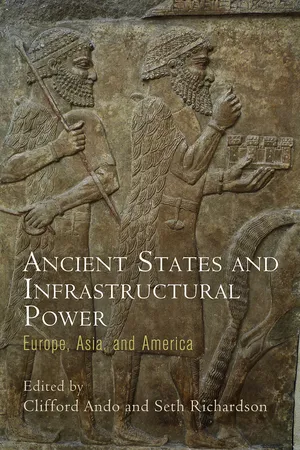
Ancient States and Infrastructural Power
Europe, Asia, and America
- 320 pages
- English
- PDF
- Available on iOS & Android
About This Book
While ancient states are often characterized in terms of the powers that they claimed to possess, the contributors to this book argue that they were in fact fundamentally weak, both in the exercise of force outside of war and in the infrastructural and regulatory powers that such force would, in theory, defend. In Ancient States and Infrastructural Power a distinguished group of scholars examines the ways in which early states built their territorial, legal, and political powers before they had the capabilities to enforce them.The volume brings Greek and Roman historians together with specialists on early Mesopotamia, late antique Persia, ancient China, Visigothic Iberia, and the Inca empire to compare various models of state power across regional and disciplinary divisions. How did the polis become the body that regulates property rights? Why did Chinese and Persian states maintain aristocracies that sometimes challenged their autocracies? How did Babylon and Rome promote the state as the custodian of moral goods? In worlds without clear borders, how did societies from Rome to Byzantium come to share legal and social identities rooted in concepts of territory? From the Inca empire to Visigothic Iberia, why did tributary practices reinforce territorial ideas about membership?Contributors address how states first claimed and developed the ability to delineate territory, promote laws, and establish political identity; and they investigate how the powers that states appropriated came to be seen as their natural and normal domain. Contributors: Clifford Ando, R. Alan Covey, Damián Fernández, Anthony Kaldellis, Emily Mackil, Richard Payne, Seth Richardson, Wang Haicheng, John Weisweiler.
Frequently asked questions
Information
Table of contents
- Cover
- Contents
- Introduction: States and State Power in Antiquity
- Chapter 1. Before Things Worked: A “Low-Power” Model of Early Mesopotamia
- Chapter 2. Property Claims and State Formation in the Archaic Greek World
- Chapter 3. Western Zhou Despotism
- Chapter 4. The Ambitions of Government: Territoriality and Infrastructural Power in Ancient Rome
- Chapter 5. Populist Despotism and Infrastructural Power in the Later Roman Empire
- Chapter 6. Territorializing Iran in Late Antiquity: Autocracy, Aristocracy, and the Infrastructure of Empire
- Chapter 7. Kinship and the Performance of Inca Despotic and Infrastructural Power
- Chapter 8. Statehood, Taxation, and State Infrastructural Power in Visigothic Iberia
- Chapter 9. Did the Byzantine Empire Have “Ecumenical” or “Universal” Aspirations?
- List of Contributors
- Index of Subjects
- Index of Citations